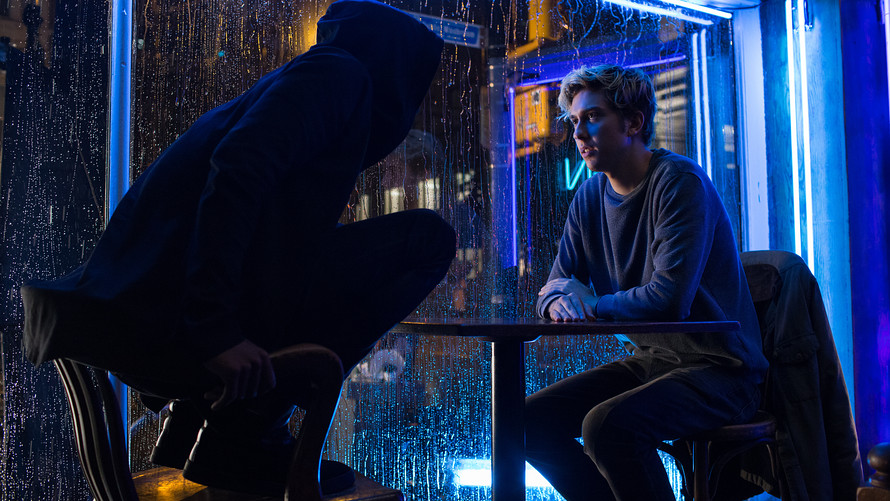Death Note Producer Doesn’t Understand Everything Wrong With This Adaptation

I completely understand if you shut it out of your brain and erased the memory, but Netflix released a trailer not too long ago of their Death Note adaptation. The trailer was troubling for a numbers of reason, and not just because the manga by Tsugumi Ohba and Takeshi Obata came out over a decade ago and most original fans have kind of grown out of that phase.
What was most puzzling about the adaptation, which again feels completely unnecessary considering there have been several movies, a television series, and a Korean musical, was the fact that this adaptation took place in Seattle and cast Nat Wolff as Light Yagami–or rather, Light Turner. The rest of the cast includes Mia Sutton, Lakeith Stanfield, Paul Nakauchi, Shea Whigham, Willem Dafoe, and Masi Oka. With the Ghost in the Shell whitewashing still fresh and in the news, the Death Note adaptation dealt with similar accusations of white-washing and erasing Asians from their own stories.
Producer Roy Lee was surprised to see the backlash against Netflix’s adaptation of Death Note, which I can understand to some extent. He’s spent a great deal of his career on U.S. remakes of Asian films, many of which had little to no backlash. In fact, The Ring, The Grudge, and The Departed were all pretty well-received and left huge pop-culture footprints. “I’ve been involved in many adaptations of content from all over the world, and this is the first time that I’ve been seeing negative press,” he says. “I can understand the criticism … if our version of Death Note was set in Japan and [featured] characters that were Japanese-named or of Japanese ancestry.” Yeah, Death Note didn’t put any of their character in yellow-face, but they did that by writing the Asian out of these character. With Asian-American having so few roles in the first place, this is a pretty unsatisfactory answer.
Lee goes on to call the film “an interpretation of that story in a different culture” made to “make it more appealing to the US or to the English-language market.” While I don’t think it’s an inherently terrible thing to put a story in a different context, the thing is Death Note was already plenty popular among the English-language market. Books sold incredibly well, to the point that schools started getting worried and trying to ban it. It didn’t need to be made “more appealing.” However, an incredibly troubling matter he doesn’t address in his defense, is the idea of transporting the story into United States culture.
Death Note is about a young, model student who gets his hands on a Death God’s notebook, allowing him to kill anyone so long as he knows their name and face. Light, who feels like he’s doing good for the world by murdering criminals, becomes tangled in keeping his identity secret and eventually becomes a power-hungry villain with a god complex. Embedded into this story is the harshness of public attitude towards crime in Japan, along with how their low crime rate and high conviction rate is often attributed to both a strong law-abiding culture and a critique of law enforcement’s tendency to refuse cases unless there are strong chances of conviction. It’s clumsy at times and reaches ridiculous levels of exploring moral judgement, but it’s a distinctly Japanese story in many ways.
Think a bit about how the story of a white man with a god complex who takes it upon himself to kill criminals in the United States sounds. Think about how the language of “cleansing the world” of evil sounds coming from someone that looks like Nat Wolff. Think about how this is nothing revolutionary, or subversive. On the specific point of whitewashing, Lee isn’t happy about the label, asserting “one of them is Asian, one’s African-American, and three are Caucasian. Saying ‘whitewashing’ is also somewhat offensive,” he added, “one of our three leads is African-American.” He’s referring to Keith Stanfield, who plays the detective L, a brilliant eccentric character who tries to find the cause of the mysterious deaths. Spoilers for this decade old series–Wolff’s Light is going to kill a black man with his Death Note with almost no immediate consequences because he gets in the way of his killing. This isn’t just completely tone-deaf as an adaptation, it’s dangerous.
“People can criticize it, but I’d say that they should see the movie first,” Lee says. “Then they could accuse us of not having a diverse enough cast … just judge the movie after it comes out.” Diversity is only one of many issues with Netflix’s Death Note, but again, as we saw with Iron Fist, if you fail to promote or sell or product properly, it’s not on us to give our business anyway. Go watch one of the many other adaptations instead. Better yet, go read Bakuman it’s way better.
(via Buzzfeed, Image: Netflix)
Want more stories like this? Become a subscriber and support the site!
—The Mary Sue has a strict comment policy that forbids, but is not limited to, personal insults toward anyone, hate speech, and trolling.—
Have a tip we should know? tips@themarysue.com